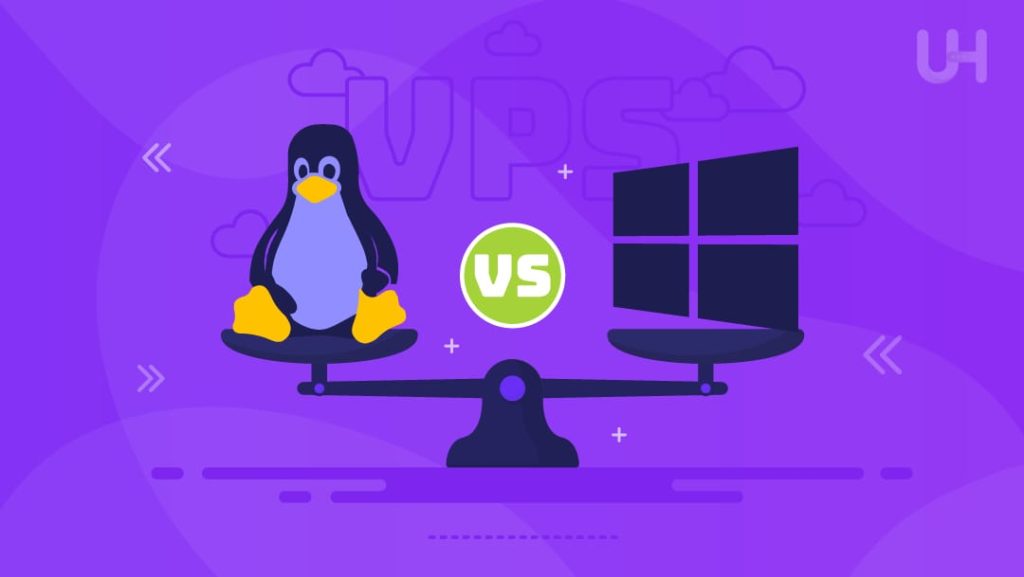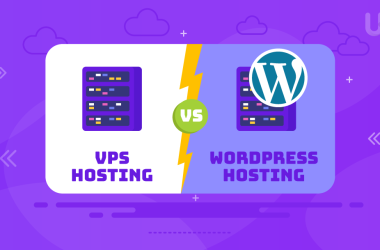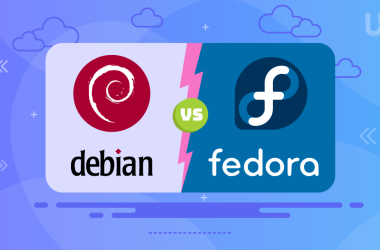
The world of web hosting offers a plethora of choices, each catering to diverse needs and preferences. Among these choices, Linux VPS vs. Windows VPS is a hot topic. Both are strong and flexible virtual server options. The question then arises: why is there a need to compare these two big names? The answer is straightforward yet profound. Each of these operating systems offers a distinct set of capabilities, benefits, and restrictions.
The decision you make between them can have a big impact on your Web Hosting, business operations, or personal projects’ efficacy, performance, and cost-effectiveness.
In this thorough article, we’ll go into the specifics of both Windows and Linux Virtual Private Servers (VPS), giving you a thorough overview and equipping you with the information you need to make an informed choice.
Understanding VPS: A Deep Dive
Before we delve deeper into the topic, let’s take a moment to understand the concept of VPS first. A Virtual Private Server, or VPS, is essentially a virtualized environment running on a physical server. It provides you with the benefits of a dedicated server without the hefty price tag. You gain full control over your VPS, allowing you to install, configure, and run software and applications in a manner that suits your unique requirements.
Windows VPS: Advantages and Drawbacks
The term “Windows VPS,” which stands for “Windows Virtual Private Server,” refers to a hosting solution that gives users access to a private virtual environment inside of a real server running the Windows operating system. This virtual server runs separately and provides segregated CPU, RAM, storage, and network connectivity resources. The Remote Desktop Protocol (RDP) enables users to connect to a Windows VPS and configure, manage, and run Windows-specific programs and services in an accustomed Windows desktop environment. Windows VPS is a well-liked option for companies, developers, and individuals looking for a strong and adaptable hosting solution due to its flexibility, scalability, and compatibility with Windows-based software.
Pros:
- User-Friendly Interface: A cheap Windows VPS server can provide you with a sense of comfort and familiarity if you are used to the Windows operating system. Those who may not be technologically inclined can benefit most from the user-friendly interface. Because you won’t have to spend time learning a new system, this familiarity can speed up server management.
- Wide Application Compatibility: Windows supports a variety of programs and apps, making it a desirable option if your operational requirements demand specialized Windows-centric software. This is especially helpful if you use programs or services that are only compatible with Windows, such as the .NET Framework, MS SQL, or ASP.NET.
- Remote Desktop Protocol (RDP): The availability of RDP service on Windows VPS is a key benefit. You can use this capability to access your VPS, which creates a setting that is very similar to a typical Windows desktop. It makes it simple to administer your server, install applications, and complete jobs effectively. It’s like having your own virtual Windows workstation.
- Strong Technical Support: You can get Windows VPS with strong technical assistance. In this aspect, Windows VPS is a strong option if you need continuing support and dependability. With help, you can count on knowledgeable support for any problems you may run into.
Cons:
- Licensing Fees: The accompanying licensing fees are a significant disadvantage of Windows VPS. You must purchase a Windows Server license in order to run a Windows VPS, which might add significantly to your overall costs. This cost is an important consideration, especially if you have a tight budget.
- Resource Consumption: Compared to Linux, Windows tends to consume more resources, which could raise hosting prices, particularly if you plan to use resource-intensive programs. To prevent unforeseen charges, it’s crucial to take your server’s resource needs into account and select an appropriate plan.
Elevate Your Hosting Experience with VPS Hosting
Whether you’re a business seeking reliability or an individual embarking on an online venture, our VPS Hosting solutions offer both Windows and Linux operating systems with the power and flexibility you need. Take the next step towards hosting success by visiting our page and discovering how Ultahost can empower your online presence.
Linux VPS: Advantages and Drawbacks
The hosting service, known as a “Linux VPS” or “Linux Virtual Private Server,” offers users a dedicated virtual environment on a physical server that uses the Linux operating system. A Linux VPS provides isolated resources, such as CPU, RAM, storage, and network connectivity, just like its Windows equivalent. Users can use Secure Shell (SSH) and other remote administration tools to log into their Linux VPS to administer and operate a variety of open-source programs. Linux VPS is a popular alternative for developers, businesses, and individuals searching for a flexible and configurable hosting solution in a Linux environment due to its affordability, reliability, and security.
Pros:
- Open Source and Economical: One of Linux’s strongest benefits is that it is an open-source operating system, which translates to cost-effectiveness. Since there are no licensing payments involved, it is a cost-effective option for individuals on a tight budget. For small enterprises, startups, or individuals searching for a hosting solution at a reasonable price, this is particularly appealing.
- Stability and Security: Linux has a stellar reputation for both. It is less prone to viruses and malware, making it a great choice for web servers where security is crucial. This stability ensures that your server is less likely to experience downtime due to security vulnerabilities.
- Unparalleled Customization: The Linux VPS’s flexibility and freedom of customization are a big plus. Your server can be customized to meet your exact demands, creating a setting that is precisely suited to your requirements. Linux is a great option for developers and expert users because of its open-source nature, which enables you to tweak and configure your server in a variety of ways.
- Resource Efficiency: Linux can do more tasks while using fewer system resources because of its exceptional resource efficiency. This aspect may result in a reduction in the cost of your hosting subscription. A Linux VPS might be able to handle the load more effectively if you’re running resource-intensive programs or websites, which would lower your hosting fees.
Cons:
- Learning Curve: There can be a learning curve for people who are unfamiliar with Linux. However, the abundance of online materials and encouraging networks may smooth the adjustment and offer helpful support. The first learning curve is more difficult, but once you understand Linux, you’ll see its benefits.
- Limited Application Compatibility: Although Linux provides substitutes for a number of well-known Windows programs, some specialized programs might not be available or might need further configuration. It’s crucial to think about the specific software that your operations require. You might occasionally need to look for alternatives or spend time setting up the software to function in a Linux environment.
Windows VPS vs. Linux VPS: The Decision-Making Process

How can you make an informed decision that best meets your needs now that we have examined the many benefits and drawbacks of both Windows vs. Linux VPS? Let’s look into the criteria that ought to influence your choice:
Familiarity and Comfort:
It might be wise to stay with what you know if you have more experience with one operating system than another because it will manage your servers and make decisions faster. Take into account both your own and collective experience. A high learning curve may be involved if you’ve been using Windows for a long time when switching to Linux. You can make a decision based on other considerations if you feel at ease with both, though.
Budget Considerations:
Your financial situation is crucial. Consider the licensing expenses linked to Windows VPS. Due to its open-source nature, Linux surely has an advantage if you’re looking for a solution that’s affordable. Make sure to thoroughly calculate your budget and account for all related expenses, such as server plans, maintenance, and any other software or services that may be needed.
Software Prerequisites:
Examine the particular programs and applications that are crucial to your business. An obvious solution is a Windows VPS if they are primarily Windows-specific. Linux, however, provides a number of possibilities to complete a wide range of tasks if flexibility is essential. Make a list of every piece of software you need, and make sure it works with both Windows and Linux. Research potential Linux alternatives as well, as some software might not be readily available.
Technical Support Needs:
Analyze whether you require technical support. Windows VPS, sponsored by Microsoft, is the obvious choice if you value the assurance of reliable, easily reachable technical assistance. Having access to professional support can be quite helpful for companies and people whose servers are essential to their operations. Be prepared to spend more time troubleshooting as Linux VPS hosting frequently relies on community-driven help, or think about choosing managed Linux VPS services with expert support.
Server Requirements:
Think about the particular requirements of your project or company. One operating system’s features and capabilities may be preferable for some projects over those of others. For instance, Windows VPS is the obvious solution if you’re running a web application, that is .NET based. However, Linux is frequently the ideal platform if you’re hosting a website created using open-source tools like PHP and MySQL.
Future Scalability:
Consider the long-term requirements of your venture or company. Think about whether your needs will change or evolve over time. Your hosting solution must be capable of scaling. Both Windows and Linux VPS are capable of supporting growth, but make sure your supplier can quickly update your server as required.
Security and Stability:
Consider how much security and stability you require. The strong security features of Linux should be taken into consideration if your project handles sensitive data or is mission-critical. On the other hand, take this into consideration if you need special security measures or compliance criteria that Windows can better handle.
Final Verdict
There is no one-size-fits-all solution in the intricate world of Windows VPS vs. Linux VPS. Your decision should be well-informed and based on your experience, financial constraints, software requirements, technical support needs, server requirements, and future scalability. Both methods have certain benefits and limitations that make them suitable for particular circumstances.
You must carefully weigh the benefits and drawbacks before deciding whether to use virtual servers for personal or professional endeavors. Your ability to use your server’s full capacity and ultimately accomplish your goals might be greatly impacted by the VPS operating system you choose.
Your choice should be exactly in line with your operational requirements so that you can maximize the use of your VPS and go closer to reaching your goals. Keep in mind that the appropriate decision can improve the efficiency of your business, lower your expenses, and improve the overall performance of your web apps or services. Make your decision wisely, and your server will become a powerful tool for success.
The first step in setting up a VPS that will serve you well and enable your projects or business to thrive is making an informed decision. So choose carefully, and may your VPS experience be fulfilling!
For those of you interested in exploring VPS hosting, we invite you to learn more about our cheap VPS Hosting services at Ultahost. There, you’ll find a variety of options to customize your hosting environment and embark on a hosting journey tailored to your specific requirements.
FAQ’s
Yes, Windows VPS tends to be more expensive due to licensing costs associated with the Windows Server operating system. Linux VPS, being open source, is often a cost-effective alternative.
Windows VPS runs on the Windows operating system, while Linux VPS uses the Linux OS. Windows VPS is more user-friendly and compatible with Windows-specific software, whereas Linux VPS is open source, cost-effective, and renowned for its stability.
Linux VPS is a preferred choice for web development and programming due to its open-source nature, extensive customization options, and robust support for programming languages like PHP, Python, and Ruby.









